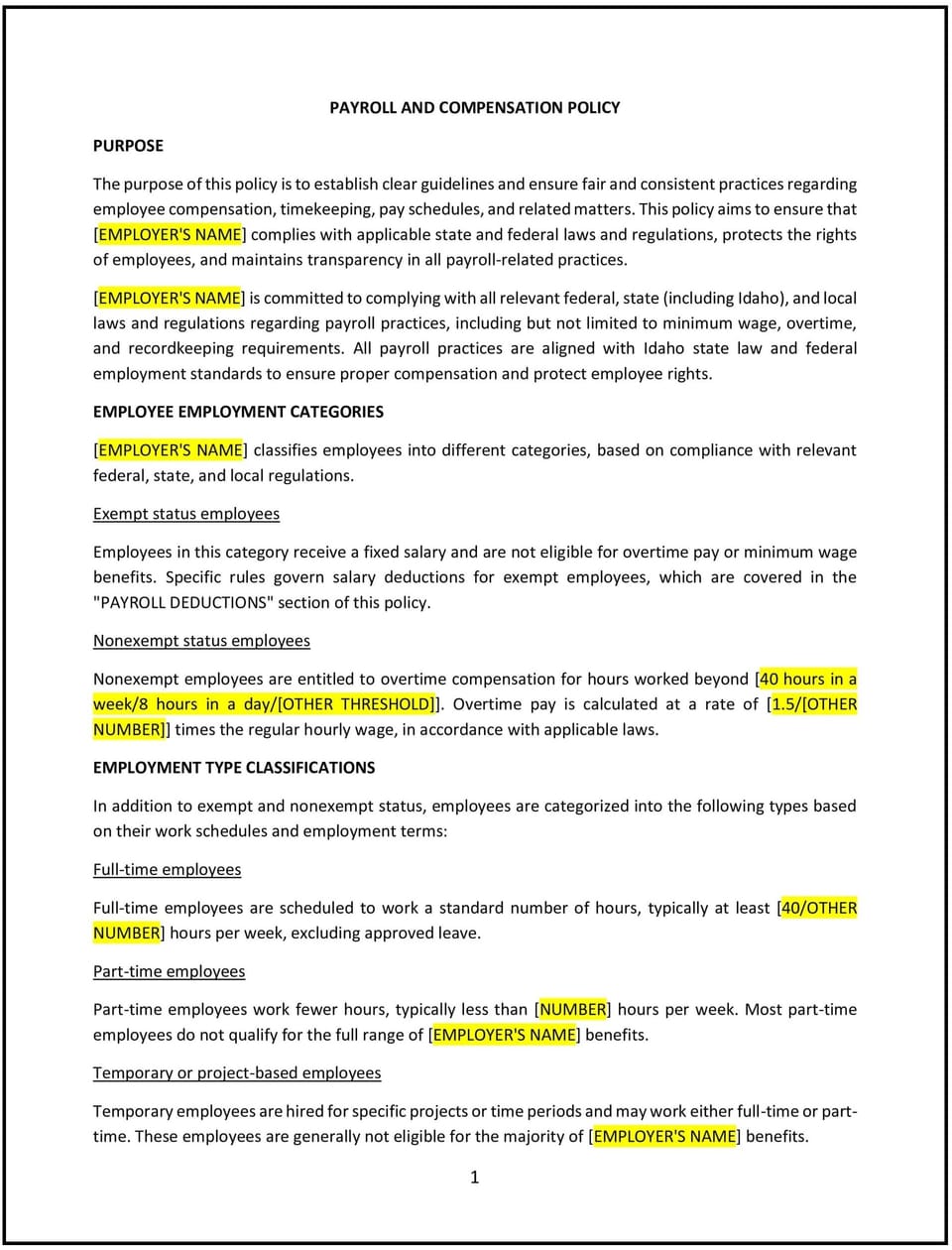Payroll and compensation policy (Idaho): Free template

Payroll and compensation policy (Idaho)
A payroll and compensation policy helps Idaho businesses establish clear guidelines for managing employee pay, benefits, and related processes. This policy outlines procedures for calculating wages, issuing paychecks, handling deductions, and administering benefits. It also emphasizes the importance of transparency, accuracy, and fairness in compensation practices.
By implementing this policy, businesses can build trust with employees, maintain accurate financial records, and ensure consistency in payroll and compensation practices.
How to use this payroll and compensation policy (Idaho)
- Define pay periods: Specify the frequency of pay periods, such as weekly, biweekly, or monthly, and outline the process for calculating hours worked, overtime, and bonuses.
- Outline payment methods: Explain how employees will receive their pay, such as direct deposit, paper checks, or pay cards, and provide instructions for setting up or updating payment preferences.
- Address deductions: List the types of deductions that may be taken from employee paychecks, such as taxes, insurance premiums, retirement contributions, or wage garnishments.
- Detail overtime and bonuses: Provide guidelines for calculating overtime pay, as required by Idaho and federal laws, and outline eligibility criteria for bonuses or incentives.
- Communicate benefits: Explain the benefits available to employees, such as health insurance, retirement plans, or paid time off, and how they are administered.
- Establish record-keeping practices: Outline the business’s procedures for maintaining accurate payroll records, including hours worked, pay rates, and deductions, in compliance with Idaho and federal laws.
- Review and update the policy: Periodically assess the policy’s effectiveness and make adjustments based on changes in business needs, employee feedback, or Idaho laws.
Benefits of using this payroll and compensation policy (Idaho)
This policy offers several advantages for Idaho businesses:
- Builds employee trust: Clear and transparent payroll practices foster trust and confidence among employees.
- Maintains accuracy: Structured procedures help ensure payroll calculations, deductions, and benefits administration are accurate and error-free.
- Promotes fairness: Consistent application of the policy ensures all employees are treated equally in terms of pay and benefits.
- Reduces legal risks: The policy helps businesses comply with Idaho and federal payroll laws, minimizing the risk of disputes or penalties.
- Enhances efficiency: Clear guidelines streamline payroll processes, reducing administrative burdens and improving operational efficiency.
- Supports employee satisfaction: Timely and accurate pay, along with clear communication about benefits, contributes to higher employee morale and retention.
Tips for using this payroll and compensation policy (Idaho)
- Communicate the policy clearly: Share the policy with employees during onboarding and through internal communication channels to ensure awareness and understanding.
- Train payroll staff: Provide training for payroll administrators on how to calculate wages, handle deductions, and maintain accurate records in compliance with Idaho and federal laws.
- Monitor payroll processes: Regularly review payroll practices to ensure accuracy, consistency, and compliance with the policy.
- Stay informed about legal updates: Keep up-to-date with changes to Idaho and federal payroll laws and update the policy as needed.
- Encourage transparency: Foster open communication with employees about their pay, benefits, and any changes to payroll processes.
- Document everything: Maintain detailed payroll records, including hours worked, pay rates, deductions, and benefits, to ensure accountability and compliance.
Q: Why should Idaho businesses have a payroll and compensation policy?
A: A payroll and compensation policy provides clear guidelines for managing employee pay and benefits, ensuring accuracy, transparency, and compliance with Idaho and federal laws.
Q: What should businesses include in their payroll policy?
A: Businesses should outline pay periods, payment methods, deductions, overtime calculations, benefits administration, and record-keeping practices.
Q: How should businesses handle overtime pay?
A: Businesses should calculate overtime pay based on Idaho and federal laws, typically at 1.5 times the employee’s regular rate for hours worked beyond 40 in a workweek.
Q: What deductions can businesses take from employee paychecks?
A: Businesses can deduct taxes, insurance premiums, retirement contributions, and wage garnishments, as long as they comply with Idaho and federal laws.
Q: How can businesses ensure accurate payroll records?
A: Businesses should maintain detailed records of hours worked, pay rates, deductions, and benefits, and regularly review payroll processes for accuracy.
Q: What steps should businesses take to communicate benefits to employees?
A: Businesses should provide clear information about available benefits during onboarding, through employee handbooks, and during open enrollment periods.
Q: How often should businesses review their payroll and compensation policy?
A: Businesses should review the policy annually or as needed to ensure it aligns with current Idaho and federal laws, business needs, and workforce dynamics.
This article contains general legal information and does not contain legal advice. Cobrief is not a law firm or a substitute for an attorney or law firm. The law is complex and changes often. For legal advice, please ask a lawyer.


